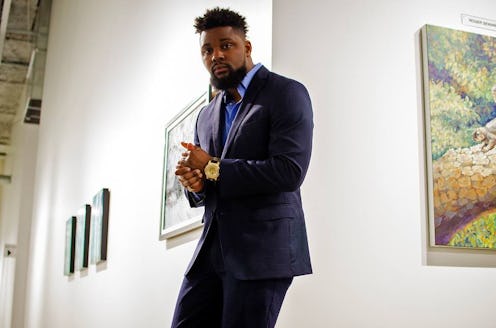Entertainment
This Film Festival Highlights Black Filmmakers

When film and television producer Jeremy (J.O.) Malone first started his career in Hollywood, he noticed a severe lack of Black filmmakers in the industry — and quickly realized that this absence had a clear connection to the lack of representation of Black people onscreen. That is why Malone started the National Black Film Festival, which will take place in Houston on April 5-9 for the first time ever, and which highlights the contributions of Black filmmakers and actors.
"Films make you think differently. What people see in the media about racial stereotypes ends up being what they believe that specific race is about," Malone tells Bustle in a recent interview. "When police see you on the street and their scared of us [Black] people, it's because they don't know our stories. We need to change how the mainstream sees Black people's stories. The narratives and diversity in roles for Black people can't change if there aren't enough Black producers, directors and screenwriters in the industry there to change it."
In recent years, the lack of diversity in the film industry both in front of the camera and behind the scenes has become a focus for reform, and it's clearly needed. In 2016, a study by The Washington Post found that 89 percent of filmmakers in the industry are male, and 84 percent are white, with roughly half of them 60 or older. Meanwhile, Black directors accounted for just six percent of filmmakers of the top 600 films between 2007 and 2013, according to an Annenberg School of Communication and Journalism study from 2013.
With his film festival, Malone is hoping to change this ratio, even on a small scale. "I've always had a vision of building what people call Hollywood in Houston," he explains. "[I'm] trying to follow the footsteps [and] do the same thing Tyler Perry did in Atlanta and what Spike Lee did in New York. It's important for me to build that establishment that our city has Black creatives who have a town to make great films."
The festival will offer acting and filmmaking workshops, panel discussions about the industry, and screenings of various entries by local, national and international indie filmmakers. The movies submitted range from shorts to feature films to documentaries, and while they vary in genre, Malone says his biggest goal for the festival is that the filmmakers behind each movie have a place to groom their creative mindset and sharpen their skills.
"It's important for people here to see all of the talented industry professionals come together and give the best advice they can get to learn about filmmaking," Malone says. "Learning how to be tell our stories correctly, learning how to shoot and edit correctly — that's the most important thing when we think about the foundation of Black films."
As a director himself, Malone understands that the industry needs more Black stories, and that festivals like his can help get Black filmmakers' voices heard in a way they might otherwise not. "This is one of the most important things I've ever done in my life, because we are going to change lives with this festival. People will learn how to tell their stories," he says. "Society won't get to see our personal lives as Black people everyday, but they will see our movies in theaters and that's how we will be able to communicate who we really are."
When diversity is a focus of the film industry, more worthy stories are brought to viewers' attention. Malone's festival is a great way to highlight filmmakers who might not be honored by "traditional" Hollywood, and hopefully, it'll encourage the rest of the industry to include more non-white directors, producers, and actors in the landscape.